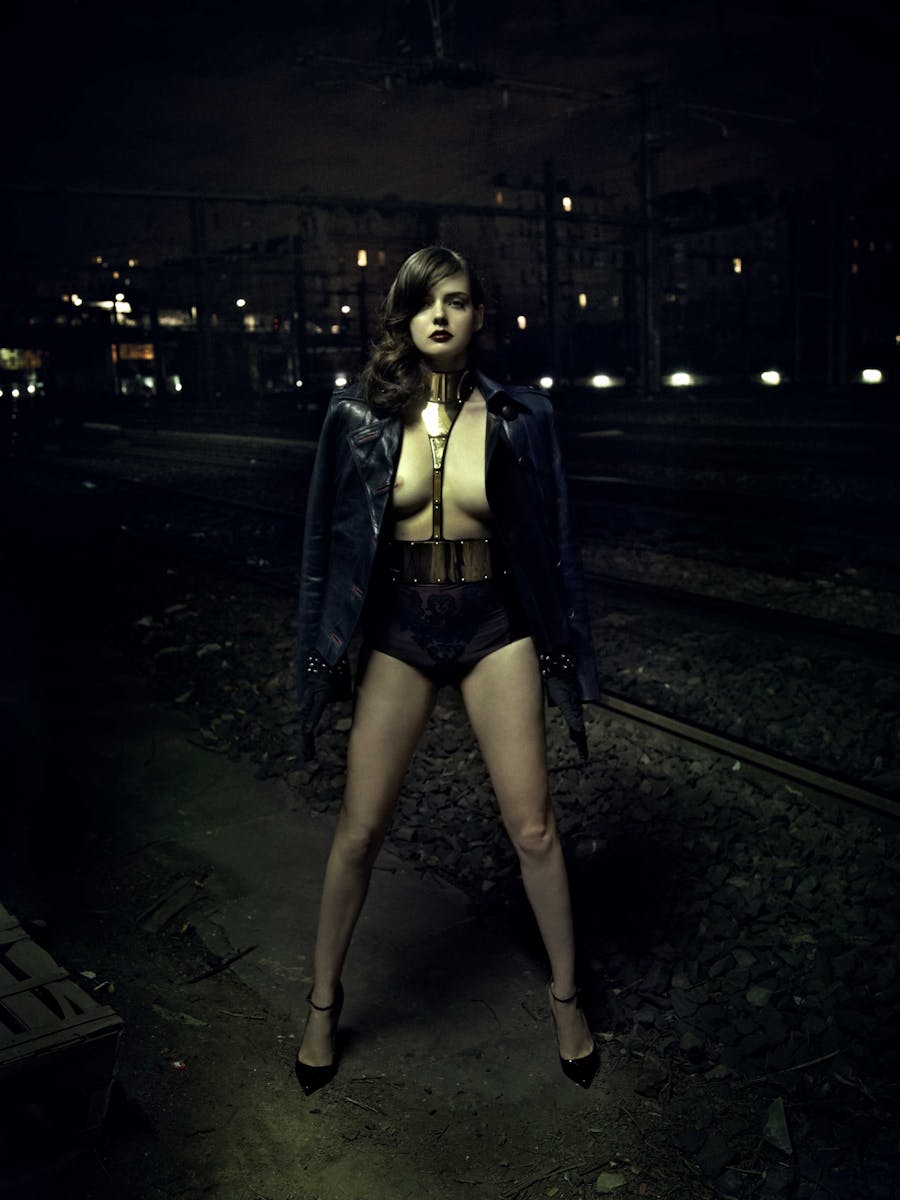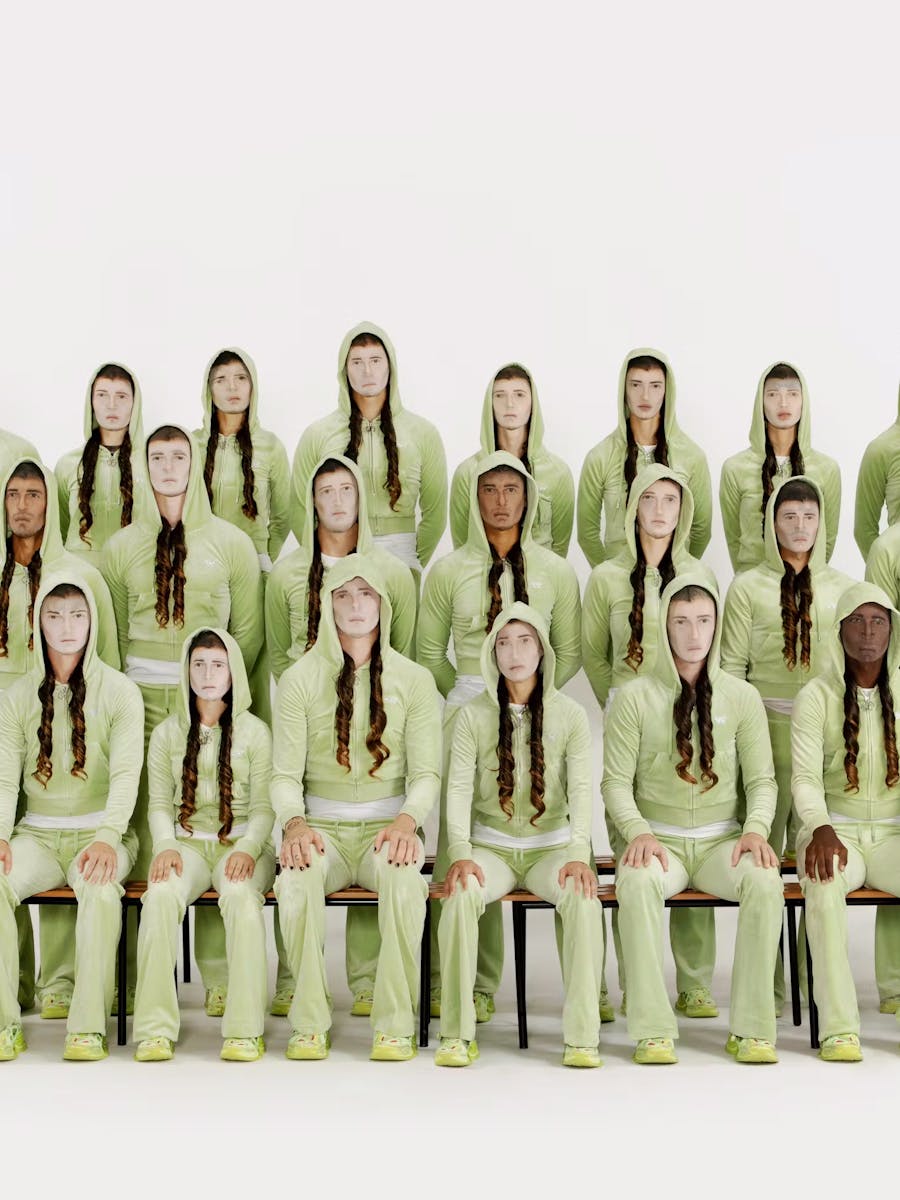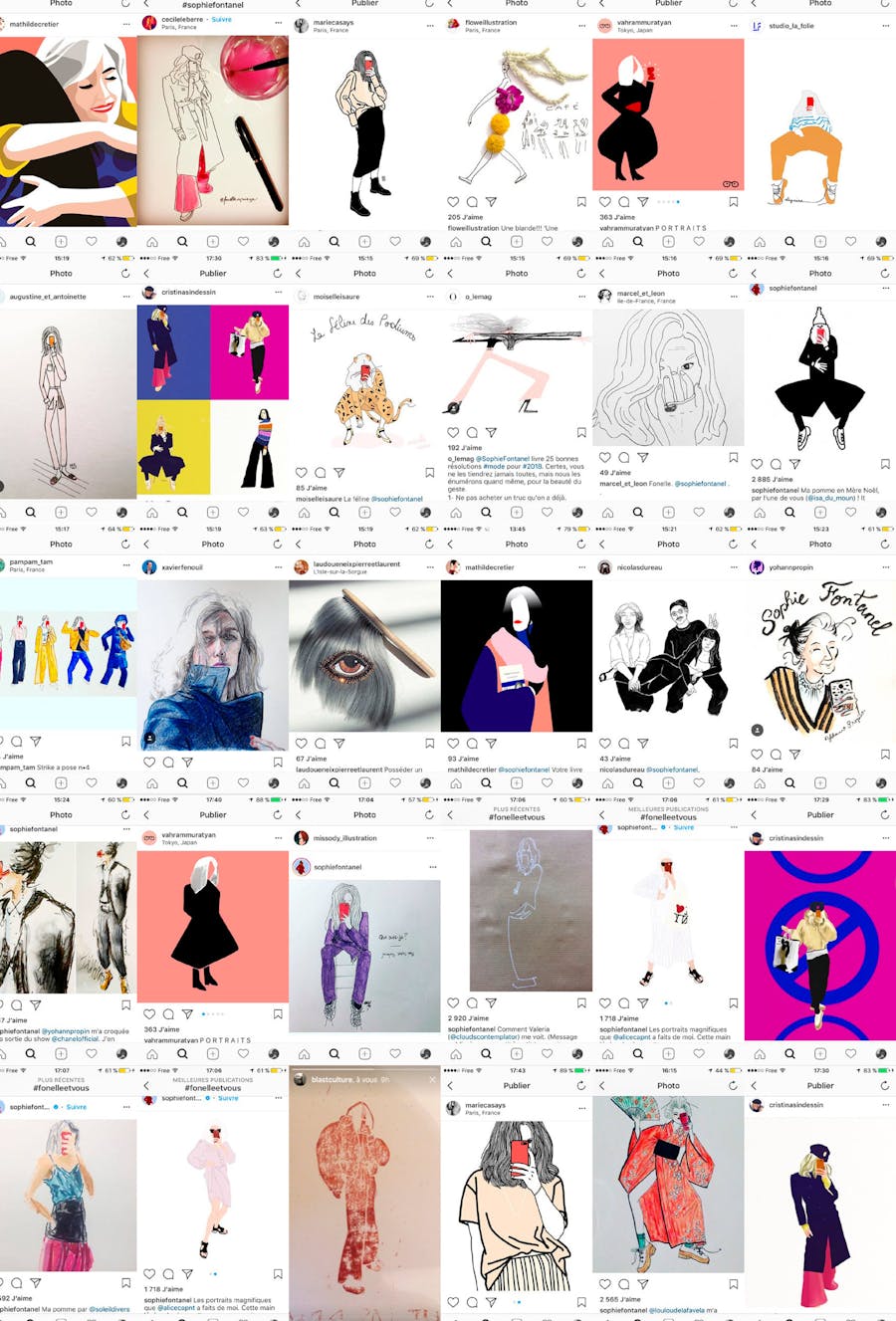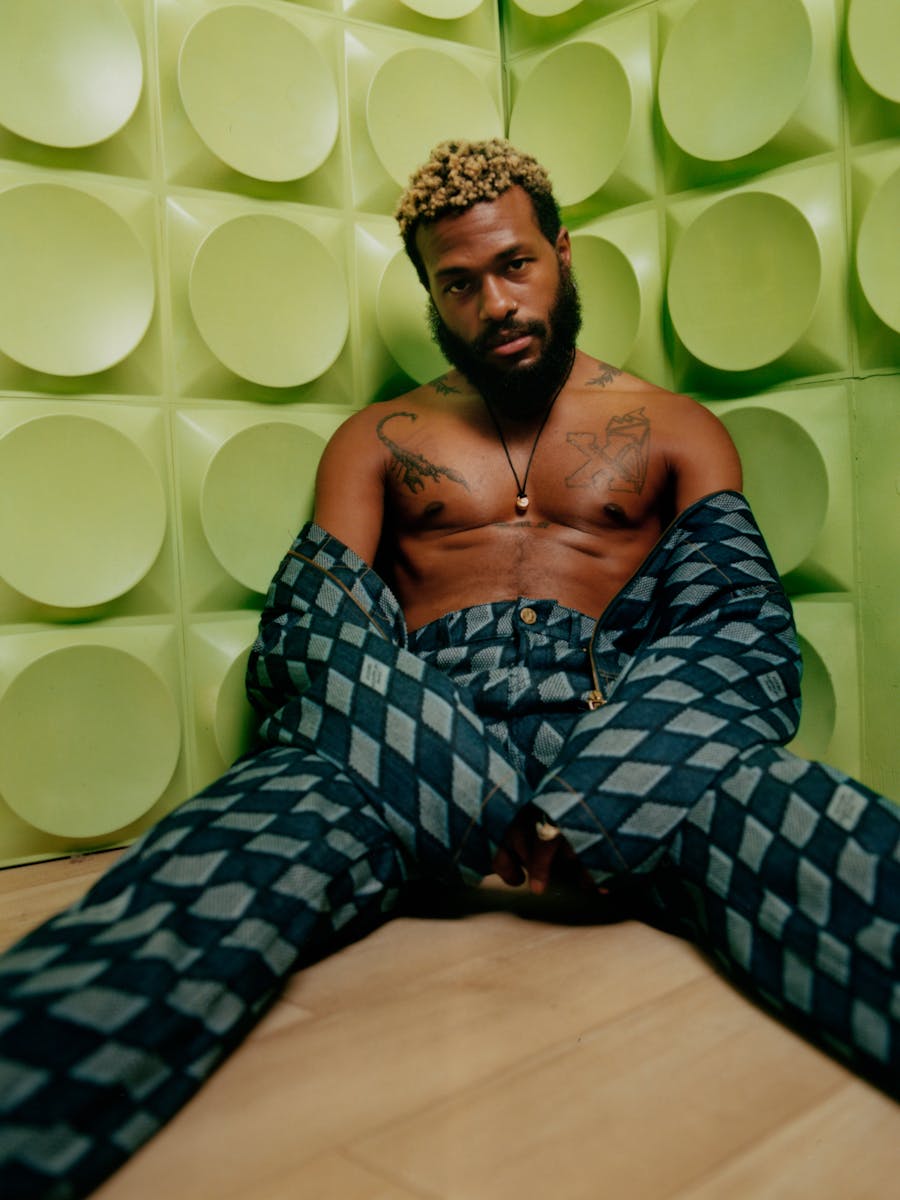From the Euphoria Issue
During the pandemic, Bruno Sialelli, the creative director of Lanvin, distilled a euphoriant kind of fashion, the perfect antidote to the morosity of the moment, in direct opposition to the proliferating political and intellectualising discourses of the period. It was also a way of reminding us that fashion is a site of fun and festivity.
How did you get into fashion?
I grew up in Marseilles, in a town that was very different from what it has become nowadays. My mother is the sister of the French comedian, Elie Kakou, who passed away at the end of the 90s. When his career took off, he surrounded himself with people he trusted, including his sister, who became his right-hand man and his costumier. She was also a fortune teller. I observed my uncle’s work through the eyes of a child, then those of a teenager : there was something very visual in his shows and his performances, particularly through the creation of characters who existed first and foremost through their costume and their style, in a really extreme way. In reality, all of that is similar to the way fashion functions. I myself feel like I am creating and dressing characters who express something about the society and the world that surrounds me. Very early on, I understood the extent to which the choice – or non-choice – of look, of dressing oneself in a given way is always perceived as something significant in the eyes of the other. Even those who want to be anti-conformist or anti-fashion adopt a uniform that represents and symbolizes something.
Was your mother particularly into fashion?
My mother had a very strong style. When I was little, she wore a lot of Versace. She concocted some really crazy looks. I was lucky enough to meet wonderful people, who were quite eccentric in their way of dressing, doing their hair and their make-up. At a very young age, it was something that attracted me. But I also remember my first stirrings of interest in fashion in the 90s, watching music videos on TV, when the stars that I liked began to brand their look through fashion labels.
Indeed, you made a euphoric video in the middle of the pandemic which brought to mind those MTV years…
I wanted to reconnect with that fashion, the one that attracted me at the very beginning. I really missed being able to party during the pandemic. We imagined ‘unapologetic’ content, very ironic, very tongue-in-cheek. As a kid from Marseilles, I’ve always liked the show-off fashion of Gwen Stefani, Foxy Brown, icons of that sort.
You were saying that your mother was a fortune teller. Is that something that interests you as well?
Yes, a great deal. But my mother doesn’t want to tell me my fortune.
Have you had your fortune read by someone else?
Yes. I think we are masters of our own destiny, but I also think that we encounter seers, mentalists, people who are connected and who can either give us answers or lead us towards them in a certain way. I think that good seers fall into that category. Sometimes I might consult one but I don’t depend on that kind of thing. Sometimes I have the feeling that there is a change coming in my life and I tell myself that it can help me. I’m interested in astrology, numerology, the occult in general. My mother -- it’s almost as if she has had several lives -- she’s got an old soul. I feel like the lives of people that she meets, the questions they ask themselves, the experiences they have had, produce a logical consequence for her. She foresees what could happen to them; she just does the maths. There are major schemas in life ( which can be more or less complicated) that tally, and with a specific sensibility you can manage to read them and interpret the situation accordingly. But there is also this issue of being able to ‘see’ things, which doesn’t come from the cards per se. The cards are a final support mechanism, a way of confirming what you intuit.
Your profession is also very intuitive. You have to be able to imagine six months in advance.
Yes, there’s a really speculative element to it. The fact of feeling things, witnessing desires as they emerge, seeing things before they happen -- it’s a fragile ecosystem. There is a desire to imagine what the near future will be like, but also to not get too far ahead. There are things that can’t be understood at the time they are first suggested.
This task has been, I imagine, much harder during the pandemic year when we have all had so little to guide us...
Indeed, the future has become very blurry and the speculative element has become all the more important. In such a context, saying ‘this is what tomorrow will be like’ through the prism of the brand is a very complex thing. It’s a real skill but I think that we [ed’s note: creative directors] are perhaps the best people to play this game and to style it out. In any case, we exist within this dynamic of always having to go back to the drawing board. We have to constantly reinvent ourselves.
Generally speaking, you are like a sponge, soaking up everything around you, no?
Yes, and it’s a process that can be very intellectualized, even politicized. During the pandemic, many artists brought a serious gaze to bear on things, in quite a challenging way, and then there was an opposite tendency, where we saw a ‘kiss cool’ effect emerge, which consisted in inventing a form of escapism, talking about the things we were missing, and our frustrations.
Was that the kind of thing you were doing?
Yes. I wanted to offer antidotes.
Do you manage to cut yourself off from the constant flow of information?
As a creative director, you must have a point of view that goes beyond clothing, you must bring your gaze to bear on other fields of artistic expression: music, art, architecture… So you basically work all the time, you have so much information to communicate to the teams, so many presentations to organize… You even choose what you consume culturally with a view to what you can draw from it. When you’re an artistic director and you are dealing with an advertising campaign, a show, a collection, all at the same time, it’s a survival reflex. Unfortunately you cannot watch five films a day, read two books a day, visit five exhibitions a day, so, necessarily, you have to choose. During the first lockdown, I started to watch films which could potentially help me in my work and then, after a while, that exigency disappeared and I felt freer to go towards things that, in a normal period of my life, I would have perhaps left to one side… But, generally speaking, in fashion you can’t prevaricate for a long time, you have to take a position. It is a very special kind of manoeuvre, but one I really like. That being said, without ever having done it, you can’t know. Before I arrived at Lanvin, I was the design director of the menswear collections at Loewe. That was already a big responsibility, but this is something else entirely. You have to live it to understand it.
Have you come to understand what truly inspires you?
There are a lot of different layers and you can work with a certain methodology, but as for me, I have the impression that someone is talking to me, someone is whispering in my ear.
For example, for the campaign with Paris Hilton [ed’s note: face of the Lanvin spring-summer 2021 campaign], even if the idea came from a series of things I’d seen and felt, I also felt it had been communicated to me.
Like poetic inspiration...
But you also have to make yourself receptive to it. It’s like you were saying, as an artistic director you are a social antenna and you have to open yourself up to the signal. There are currents passing above us and we register them or we don’t, or we register them only partially. It is really a delicate manoeuvre because you constantly have to breathe ideas into other people. You are almost like a kind of oracle, you have to incubate ideas, literally. The more you do it, the more you are capable of doing it and then you are able to be inspired by anything and everything. You become increasingly capable of seeing something in the banal and drawing something from it. It’s really an opening up and it’s infinite. I would almost compare it to love. It’s a bottomless well, ultimately. You create as much love as you need. Creativity is the same, basically.
And euphoria, what does that say to you?
It’s like a delusional flash which can appear in many different situations: I’m thinking of parties, of music, or when you land in a place you don’t know… There is an animal side to euphoria, it’s instinctive.
Do you associate euphoria with a particular time in your life?
There are times in your life which you approach with impatience, and it can be intoxicating when they arrive, like certain highpoints in your career, in the most inspirational sense of the word. I’m also thinking about possibilities of artistic expression in which you feel completely free.
Discovery in general.
Sexuality.
But I’m thinking above all of music, of communion, of the effect of being part of a group, of that sensation of well-being which is amplified as it travels from person to person...
It’s like a relay; it provokes a kind of hysteria. I see that as something very positive, as if you were secreting something within you, it’s almost chemical. When I was little, hearing 8000 people shout ‘Elie Kakou’, which at that time was my mother’s surname, in venues like the Zenith in Paris or the Olympia, it was total euphoria! Seeing people let go like that! Euphoria was what my uncle lived off. And he was extraordinarily generous. At the end of his shows, he would bring out a table and a chair and sign as many autographs as there were fans. Sometimes it lasted two hours.
You really like to party, right?
Since forever.
Is partying for you an opportunity for you to observe and to conduct research in your creative process?
I still feel young, included in the ‘kids’ category, but actually when I actually go out and see kids of 18-20 dancing, I see that I’m in the next phase. It’s something that I like to observe; it inspires me to see how young people dress, how they dance, the freedom they grant themselves, and they’re going even further than my generation… They are facing some serious problems in political and ecological terms, but on some fronts things are advancing more than they’ve ever done before, especially in terms of gender and sexuality.
Do you sometimes experience euphoria in your creative process? If so, at what point does it emerge?
There is something very exciting in the genesis of a collection, but it’s not euphoria. Euphoria is really a physical phenomenon, it’s not controllable, and it’s a feeling that comes at the end of the process. It’s typical of the end of a show: everyone is wired, you are living on your nerves, you see things coming together, the planets align. When it’s over, everyone goes crazy and starts to hug each other. But after that I fall into depression. A positive state can only exist in contrast to a negative state. Like every intensification, the opposite reaction occurs and it is a completely physiological experience.
Have you ever felt a form of aesthetic ecstasy?
When I’ve seen beauty in general. Human beauty, artistic beauty. Beyond a work which can transcend me, it’s a question of manoeuvring yourself: when you enjoy experiencing that state, you seek it out.
Is there then an emotion which you are trying to reach?
Yes. Euphoria is the fact of existing. It is a quest. You can look for it everywhere and find it everywhere. You can create euphoriant situations for yourself, without becoming addicted. Bring people together, create opportunities for people to meet -- that’s exciting. I feel like I’ve just been in a meeting of Euphoria Addicts Anonymous (laughter)!




